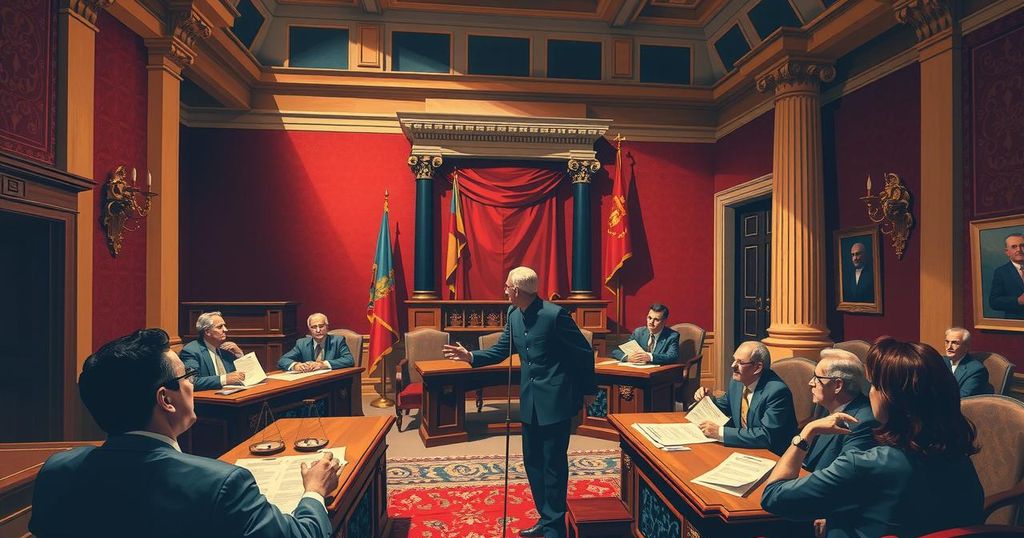Hurricane Helene Sparks Climate Change Debate During Vice Presidential Forum
Hurricane Helene has devastated numerous states, resulting in significant loss of life and displacement. During a vice presidential debate, climate change was discussed in connection to the hurricane’s impacts. Senator J. D. Vance expressed skepticism about human-caused climate change, while Governor Tim Walz praised the Biden-Harris administration’s climate initiatives, particularly the Inflation Reduction Act, advocating for a balanced energy policy. The discussion underscores contrasting views on environmental responsibility amidst ongoing disaster recovery efforts.
This week, Hurricane Helene made landfall, wreaking havoc across states including Florida, Georgia, South Carolina, North Carolina, Tennessee, and Virginia. The hurricane resulted in the deaths of over 160 individuals, displacing thousands, and inflicting extensive damage on homes and infrastructure. In the wake of this disaster, search and rescue operations are actively ongoing, with more than 600 individuals still reported missing. In a timely inquiry during the recent vice presidential debate, moderator Norah O’Donnell raised the pressing issue of climate change, indicating that a strong scientific consensus exists regarding the unprecedented warming of the planet, which has been linked to an increase in the frequency and severity of hurricanes. Both O’Donnell and fellow moderator Margaret Brennan connected the catastrophic effects of Hurricane Helene to climate change. This assertion was supported by preliminary analysis from researchers at Lawrence Berkeley National Laboratory, which posited that climate change may have intensified rainfall in certain areas of the U.S. Southeast by up to 50%. Although this analysis has not undergone peer review, it utilizes established methodologies from previously peer-reviewed studies. When questioned about the responsibility of a prospective Trump administration in addressing climate change, Ohio Senator J. D. Vance (R) acknowledged public concern over extreme weather patterns. However, Vance expressed skepticism regarding the role of human-induced carbon emissions in climate change, advocating instead for a strategy that emphasizes reshoring manufacturing and boosting domestic natural gas production as solutions. He affirmed, “we want the environment to be cleaner and safer.” In contrast, Minnesota Governor Tim Walz (D), who is aligned with Vice President Kamala Harris, commended the Biden-Harris administration for the implementation of the Inflation Reduction Act (IRA). Walz characterized the IRA as the largest climate investment in history, allocating billions towards climate change initiatives and the expansion of domestic green energy. He articulated the need for a dual approach: maintaining oil and gas production while simultaneously advancing renewable energy sources, contesting the narrative that job creation must come at the expense of environmental stewardship. Walz remarked, “a false choice” exists in the belief that the U.S. must choose between economic growth and environmental protection. Walz also took the opportunity to criticize former President Trump’s dismissive stance on climate change and his favorable policies toward oil and gas sectors in exchange for campaign support, asserting, “My farmers know that climate change is real.” When the topic turned back to whether Vance concurred with Trump’s claim that climate change is a hoax, Vance did not address the question directly, instead highlighting that manufacturing solar panel components in China may not contribute to a cleaner economy. Walz countered, advocating for a comprehensive energy policy that promotes job creation domestically.
Hurricane Helene’s recent devastation has brought attention to the broader implications of climate change, particularly in the context of U.S. political discourse. The correlation between severe weather events and rising global temperatures has become increasingly acknowledged, leading to urgent discussions about environmental policy during public debates. The conversation around climate change is crucial not only for immediate disaster response but also for long-term strategies that integrate economic growth with environmental preservation. This backdrop of Hurricane Helene’s impact has set the stage for the candidates to articulate their respective policies on climate and energy as they connect to the well-being of communities affected by such natural disasters.
The recent vice presidential debate highlighted significant differences in the candidates’ approaches to climate change and disaster response following Hurricane Helene. While Senator Vance expressed skepticism about the extent of human impact on climate, advocating for domestic manufacturing and fossil fuel production, Governor Walz emphasized the transformative potential of the Inflation Reduction Act and a balanced energy strategy. The debate reflects broader societal concerns regarding climate policy’s role in safeguarding both the environment and economic stability.
Original Source: eos.org




Post Comment